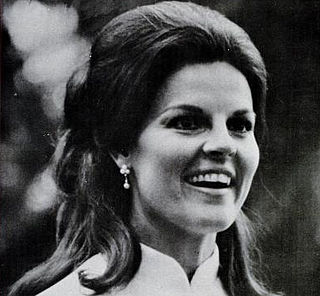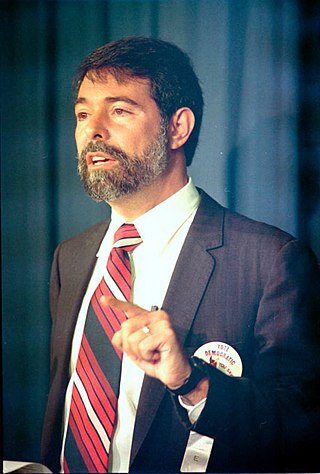
A screwdriver is a simple and popular alcoholic highball drink made with orange juice and vodka. In the UK, it is referred to as a "vodka and orange". While the basic drink is simply the two ingredients, there are many variations. Many of the variations have different names in different parts of the world.

Anita Jane Bryant is a retired American singer and anti-gay activist. She had three top 20 hits in the United States in the early 1960s. She was the 1958 Miss Oklahoma beauty pageant winner, and a brand ambassador from 1969 to 1980 for the Florida Citrus Commission.

The Human Rights Campaign (HRC) is an American LGBTQ advocacy group. It is the largest LGBTQ political lobbying organization within the United States. Based in Washington, D.C., the organization focuses on protecting and expanding rights for LGBTQ individuals, including advocating for same-sex marriage, anti-discrimination and hate crimes legislation, and HIV/AIDS advocacy. The organization has a number of legislative initiatives as well as supporting resources for LGBTQ individuals.
This is a list of notable events in the history of LGBT rights that took place in the year 1978.
This is a list of notable events in the history of LGBT rights that took place in the year 1977.

Opposition to legal rights for lesbian, gay, bisexual, and transgender (LGBTQ) people exists throughout the world. LGBT rights opponents may be opposed to the decriminalization of homosexuality; laws permitting civil unions or partnerships or supporting LGBT parenting and adoption, LGBT military members, access to assisted reproductive technology, and access to sex reassignment surgery and hormone replacement therapy for transgender individuals.

California Proposition 6, informally known as the Briggs Initiative, was an unsuccessful ballot initiative put to a referendum on the California state ballot in the November 7, 1978 election. It was sponsored by John Briggs, a conservative state legislator from Orange County. The failed initiative sought to ban gays and lesbians from working in California's public schools.
This is a list of notable events in the history of LGBT rights that took place in the 1970s.

Save Our Children, Inc. was an American political coalition formed in 1977 in Miami, Florida, to overturn a recently legislated county ordinance that banned discrimination in areas of housing, employment, and public accommodation based on sexual orientation. The coalition was publicly headed by celebrity singer Anita Bryant, who claimed the ordinance discriminated against her right to teach her children biblical morality. It was a well-organized campaign that initiated a bitter political fight between gay activists and Christian fundamentalists. When the repeal of the ordinance went to a vote, it attracted the largest response of any special election in Dade County's history, passing by a more than 2-to-1 margin.

Lesbian, gay, bisexual, and transgender (LGBTQ) people in the U.S. state of Florida have federal protections, but many face legal difficulties on the state level that are not experienced by non-LGBT residents. Same-sex sexual activity became legal in the state after the U.S. Supreme Court's decision in Lawrence v. Texas on June 26, 2003, although the state legislature has not repealed its sodomy law. Same-sex marriage has been legal in the state since January 6, 2015. Discrimination on account of sexual orientation and gender identity in employment, housing and public accommodations is outlawed following the U.S. Supreme Court's ruling in Bostock v. Clayton County. In addition, several cities and counties, comprising about 55 percent of Florida's population, have enacted anti-discrimination ordinances. These include Jacksonville, Miami, Tampa, Orlando, St. Petersburg, Tallahassee and West Palm Beach, among others. Conversion therapy is also banned in a number of cities in the state, mainly in the Miami metropolitan area, but has been struck down by the 11th Circuit Court of Appeals. In September 2023, Lake Worth Beach, Florida became an official "LGBT sanctuary city" to protect and defend LGBT rights.
This article concerns LGBT history in Florida.
Ronni Lebman Sanlo is the Director Emeritus of the UCLA Lesbian Gay Bisexual Transgender Center and an authority on matters relating to LGBT students, faculty and staff in higher education. She recognized at an early age that she was a lesbian, but was too afraid to tell anybody. Sanlo went to college then married and had two children. At the age of 31, Ronni came out and lost custody of her young children. The treatment toward the LBGT community and her rights as a mother are what gave Sanlo the drive to get involved in activism and LGBT politics.
SAVE is a grassroots nonprofit political advocacy organization located in Miami, Florida. Founded in 1993, the organization's stated mission is to "promote, protect and defend equality for people in South Florida who are lesbian, gay, bisexual and transgender."

In 1977, the Texas State Bar Association invited country singer Anita Bryant to perform at a meeting in Houston, Texas. In response to Bryant's outspoken anti-gay views and her Save Our Children campaign, thousands of members of the Houston LGBT community and their supporters marched through the city to the venue in protest on June 16, 1977. The protests have been called "Houston's Stonewall" and set into motion the major push for LGBT rights in Houston.

Bob Kunst is an American gay rights activist and perennial candidate.

Miami has one of the largest and most prominent LGBTQ communities in the United States. Miami has had a gay nightlife scene as early as the 1930s. Miami has a current status as a gay mecca that attracts more than 1 million LGBT visitors a year. The Miami area as a whole has been gay-friendly for decades and is one of the few places where the LGBTQ community has its own chamber of commerce, the Miami-Dade Gay and Lesbian Chamber of Commerce (MDGLCC). As of 2005, Miami was home to an estimated 15,277 self-identifying gay and bisexual individuals. The Miami metropolitan area had an estimated 183,346 self-identifying LGBT residents.
Eugene Local Measure 51 was a 1978 petition calling for a referendum in Eugene, Oregon, to repeal Ordinance no. 18080, which prohibited sexual orientation discrimination in the city. VOICE created and campaigned for the petition, and gathered enough signatures to force a referendum vote. Measure 51 passed with 22,898 votes for and 13,427 against. This bill's passage garnered national attention, with Miami anti-gay activist Anita Bryant's telegram congratulating VOICE on the victory. It is the earliest example of 35 ballot measures to limit gay rights in Oregon.

On June 22, 1977, Robert Hillsborough, a 33-year-old American gay man, was murdered in San Francisco by John Cordova, a 19-year-old from Daly City. Cordova and three other young men followed Hillsborough to his apartment in the Mission and stabbed him fifteen times in the face and chest.










